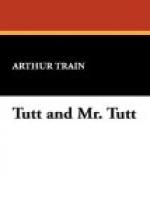With a shuffling of feet the last of the crowd pushed through the big oak doors and they were closed and locked. An officer brought a corroded tumbler of brackish water and placed it in front of Mr. Tutt. The judge leaned forward with malicious courtesy. The jury settled themselves and turned toward the lawyer attentively yet defiantly, hardening their hearts already against his expected appeals to sentiment. O’Brien, ostentatiously producing a cigarette, lounged out through the side door leading to the jury room and prison cells. The clerk began copying his records. The clock ticked loudly.
And Mr. Tutt rose and began going through the empty formality of attempting to discuss the evidence in such a way as to excuse or palliate Angelo’s crime. For Angelo’s guilt of murder in the first degree was so plain that it had never for one moment been in the slightest doubt. Whatever might be said for his act from the point of view of human emotion only made his motive and responsibility under the statues all the clearer. There was not even the unwritten law to appeal to. Yet there was fundamentally a genuine defense, a defense that could not be urged even by innuendo: the defense that no accused ought to be convicted upon any evidence whatever, no matter how conclusive in a trial conducted with essential though wholly concealed unfairness.
Such was the case of Angelo. No one could demonstrate it, no one could with safety even hint at it; any charge that the court was anything but impartial would prove a boomerang to the defense; and yet the facts remained that the whole proceeding from start to finish had been conducted unfairly and with illegality, that the jury had been duped and deceived, and that the pretense that the guilty Angelo had been given an impartial trial was a farce. Every word of the court had been an accusation, a sneer, an acceptance of the defendant’s guilt as a matter of course, an abuse far more subversive of our theory of government than the mere acquittal of a single criminal, for it struck at the very foundations of that liberty which the fathers had sought the shores of the unknown continent to gain.
Unmistakably the proceedings had been conducted throughout upon the theory that the defendant must prove his innocence and that presumably he was a guilty man; and this as well as his own impression that the evidence was conclusive the judge had subtly conveyed to the jury in his tone of speaking, his ironical manner and his facial expression. Guilty or not Angelo was being railroaded. That was the real defense—the defense that could never be established even in any higher court, except perhaps in the highest court of all, which is not of earth.




